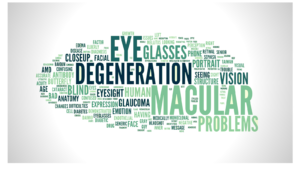Macular Degeneration | Signs and Symptoms
March 13, 2018
 Macular degeneration, also known as ARMD (Age Related Macular Degeneration) is a leading cause of vision loss in Americans older than 65 year old. It is a progressive disease of the macula, the functional center of the retina.
Macular degeneration, also known as ARMD (Age Related Macular Degeneration) is a leading cause of vision loss in Americans older than 65 year old. It is a progressive disease of the macula, the functional center of the retina.
The macula gives us our sharpest central vision (20/20) and our best color perception. The macula is very small and measures about 2mm x 2mm. The other portions of the retina provide peripheral vision and are less sensitive.
Two Types of Macular Degeneration
There are two forms of the disease: wet ARMD and dry ARMD. Most patients, about 90%, have dry macular degeneration. Dry macular degeneration affects both eyes, is progressive, but the vision loss is slow and insidious with mild to moderate visual loss.
Wet macular degeneration is associated with the development of abnormal blood vessels which grow within the layers of the retina. The "neovascularization" can bleed, leak and physically cause damage to the retinal layers. Wet macular degeneration also affects both eyes, but destroys vision in a matter of days or weeks. Vision loss is often severe.
Patients affected with either form are usually diagnosed after the age of 55 years old.
Symptoms of Macular Degeneration
The symptoms of macular degeneration are the same as other diseases which involve the macula; blurry vision and/or distortion. Visual symptoms caused by retinal disease are persistent, compared to temporary blurriness which may be caused by issues in other parts of the visual system.
We recommend that anyone who has persistent blurriness and/or distortion call their eye doctor.Because so many diseases can cause the same symptoms, a thorough eye examination is necessary to get to the root of the problem. Self-monitoring may be considered with the aid of an Amsler Grid.
Treatment for ARMD
There is no cure for either type of macular degeneration.
Treatment is available for wet macular degeneration only. Intra-vitreal injections (injections into the eye) are usually performed by a retina specialist. Injections are often successful in causing regression of the abnormal "neovascular" tissue. The injections usually are repeated.
Some patients with moderate to severe forms of the disease might consider AREDS eye vitamins. Consultation with your doctor is recommended before starting any vitamins.
If you have questions or concerns about your vision or simply want to schedule an appointment with Dr. Rose or Dr. Whitten at any of our locations, please call or email us!

Shilpa Rose, M.D.
Vision Correction & Dry Eye Specialist
Mark Whitten, M.D.
Vision Correction Surgeon
LASIK, Cataract & Raindrop



